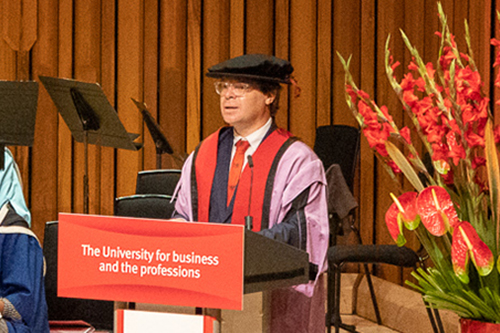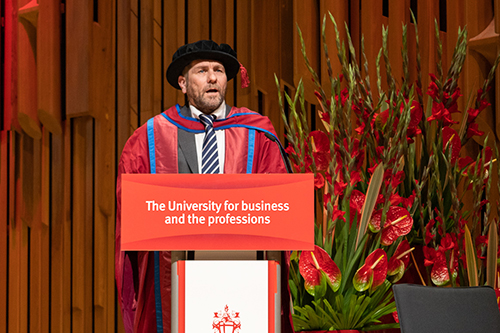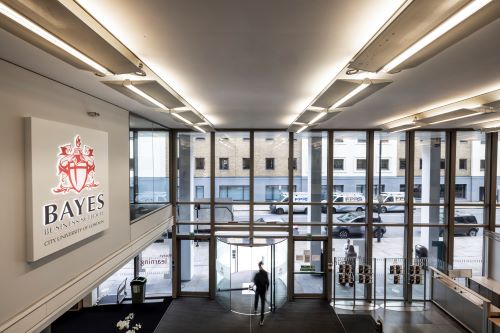By City Press Office (General enquiries), Published
"Let me start by congratulating you for your achievement today. Graduating from a degree during normal times is an achievement. Completing a degree during a global pandemic is amazing!
"Let me also thanking your family and friends for their support. You could not be here without their help and support.
"When you graduate, your thoughts naturally turn to the future. At some point today, some big questions have probably passed through your mind: Where am I going to be in 10 years’ time? How do I think the world will change in the next 25 years? What part do I hope to play in that?
"Asking questions about the future is pretty natural. To make your questions about the future a little less scary, and a little more prepare-y, let me share ten useful rules of thumb.

Rule number one: Don’t discount the future.
"Thinking about the future is hard. Most economists will tell you that humans are terrible when it comes to future. We put too much value on today and too little value on tomorrow.
"The best decision makers don’t discount the future. They realise that small investments today – whether that is of your time, energy or resources – can have much larger pay-offs in the future.
Rule number two: Ignore the noise.
"Humans are notoriously bad at making predictions. One sure fire way to improve your predictions about the future is to learn how to ignore noise. That means ignoring random information you are constantly hit with.
"One recent study of tens of thousands of forecasters found that when they were trained to ignore noise, their predictions improved by nearly 50 per cent.
"Ignoring noise is hard in this age of information overload. But, if you can train yourself to ignore that noise and pay attention to the information which counts, you increase the odds of making better predictions about the future.
Rule number three: Run the numbers
"The best forecasters ask themselves one simple question: 'on average, what is the likelihood of X happening in this type of situation?'. By asking this question, you are forced to look at the base rate.
"A base rate is the average probability that something will or won’t happen based on the best available evidence. So, if you were considering launching a new restaurant, ask yourself ‘on average how likely is it that a new restaurant is profitable within two years?’.
"You’re likely to think you will beat the averages. You might. But, be warned: everyone else thinks they will do better than average, and, at the end of the day, we can’t all do better than average.
Rule number four: Prediction is a team sport.
"We assume lone geniuses are great at seeing the future. But the reality is, most lone geniuses are terrible at coming up with accurate predictions. The ones who were right are often just lucky.
"The most consistently accurate predictions are actually made by teams. The very best predictions come from team of people from different disciplinary backgrounds, who are humble, open minded and who have an analytical bend.
"If you can find other people like this to think about the future with, then you are more likely to be right about it.
Rule number four: Paint a vivid picture.
"Once you have come up with a prediction, you need to convince others of it. The future is not just something which you predict, it is something you have to create.
"Psychologists have found that people who are able to describe their vision of the future in detailed and compelling ways are more likely to convince other people to come along for the ride. These people can describe what the future looks like, what it feels like, what it sounds like, and even what it smells like.
"So if you want to build the future, start by describing it in detail. Make it seem as real as possible. If you can clearly imagine it, then you’re more likely to get others to help in starting to building it.
Rule number five: Make the future bite-sized.
"Having a vision for the future is one thing. Bringing it to life is another. To make the future happen, you need to start by making the future bite-sized. That means breaking your vision down into small, practical actions you can do now.
"More importantly, you need to keep doing these actions. You need to make them into things which you do every day without thinking too much. If your vision is to run a marathon, you need to go out for a run each day. If you want to write a novel, you need to write a certain number of words each day. If you want to build a strong relationship, you need to doing one kind thing for the other person each day.
Rule number six: Make yourself uncomfortable
"Once you have developed some bite-sized routine, you need to slowly but surely stretch yourself. This means pushing yourself outside your comfort zone, taking on tasks you do not feel completely happy with, and putting yourself into situations which make you feel a little awkward.
"Researchers have found that when people take a course which makes them feel a little uncomfortable, they are likely to learn the most.
"Whenever you feel hesitant about something and start worrying, ask yourself ‘what can I learn from this’.
Rule number seven: Take a break from the future every now and then
"Building the future can be hard work, but to keep up that hard work you need to make time to do other things. The musician John Lennon said that ‘Life is what happens to you when you are making other plans’.
"Living life means having interests outside your work. It means spending time with family and friends. It means giving ourselves time to rest and just think a little. Researchers have found that after a certain number of hours of work, people tend to become less productive, less likely to succeed and much likely to suffer from ill health.
"Make sure you take time off to do other things. When you are doing this, the future might just show up one day.
Rule number eight: Luck is more important that you realise.
"We are taught from an early age that ingredients of success are talent, hard work and learning. That is true. But there is a crucial fourth ingredient we often forget about: luck. Our fate often rests in what the Philosopher Friedrich Nietzsche called ‘the dicebox of chance’.
"A recent study of the careers of tens of thousands of famous artists, movie makers and scientists found that many of them had a ‘hot streak’. The interesting thing is that this hot streak happened at a random moment in their career. The researcher concluded that we need to keep doing something we are good at long enough to get lucky.
"It is important that you remind yourself every now and then the role luck has played in your own life. When things don’t go your way, remember: things could have been different. When things do go your way, remember: things could have been different.
Rule number nine: The future is not a j curve
"If you speak with a futurist, they will tell you that an emerging new trend is going to take off in an exponential fashion. One hundred customers today will become one thousand customers next week, and one million customers in a month. Sure, exponential growth happens, sometimes, but it doesn’t go on forever.
"If you continue any J curve for long enough it will start levelling off and become an S-curve. If you follow it even longer, it will go into decline and become an n-curve. Today’s hot new thing is tomorrow's ho-hum and the next day's rubbish.
"If you really want to understand the path of innovation, visit the local rubbish dump and taking a careful look at all the discarded electrical items. They were once cutting-edge innovations. Today they are just junk.
Rule number ten: you never know what will be important in the long run
"The Danish Philosopher Soren Kierkergaard wrote that ‘life can only be understood backwards, but it must be lived forwards’.
"It is a bit like the future. We only see it once it has passed in our rear-view mirror. But to get there, we need to focus on the road ahead of us.
"The strange thing about the future is that we don’t know what will be important when it is happening. William Shakespeare wrote ‘If you can look into the seeds of time, and say which grain will grow and which gain will not, speak then to me’.
"I agree with him. I would love to know which things that happen today will be important for the future. The sad thing is that I don’t.
"This is why we need to be open to chance. We need to remind ourselves that today’s boredom, disappoints and random event could turn into tomorrow’s golden opportunity.
"Now you've heard my ten rules for dealing with the future, I urge you to get ready to take a step into your own future. Whatever that future might be, I know it will be exciting.
"Generations of Bayes graduates have gone on to do amazing things. They have run the world’s largest companies, they have founded successful start-ups, they been major investors, they have led non-profits, advised governments, recorded albums, written books, contributed to their communities, raised families and much more besides.
"As graduates of Bayes Business School, you join our alumni community of more than 50,000 former students from 160 different countries. This community is there to help and support you, so stay in touch.
"Dear City Graduates, Dear Bayesians - go forth and create a better future!!"
ENDS



